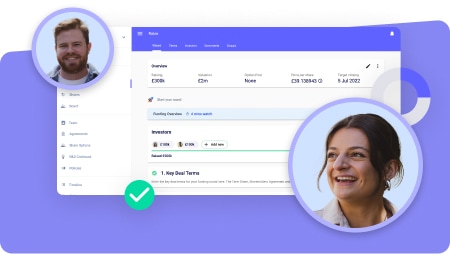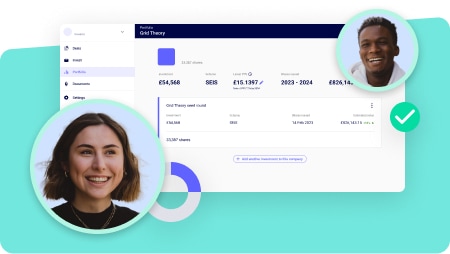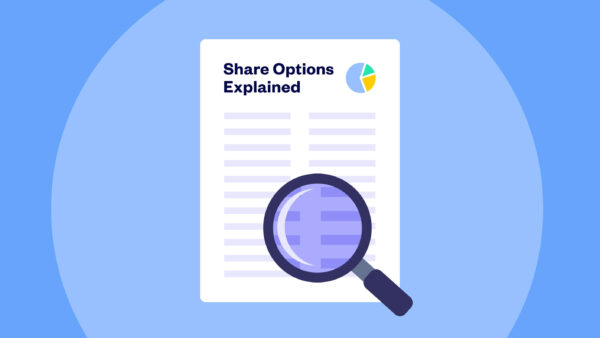Read transcript
Hello, I’m Anthony founder at SeedLegals. And I’m here to tell you as an employee some things to help you understand what share options are. Are they valuable? When can you get value from them? Why you even getting them? What does it all mean?
Now there many many articles on the internet about share options, but they’re all written for companies how to issue them to your employees, but for employees, there’s almost no information I could find so I figured I’d make this video.
So the first thing: what are share options?
Well, the first thing is we all know what shares are. You’ve got shares in Apple or Revolut or whatever, and shares gives you a fraction ownership in the company. So why doesn’t the company just give you shares? The reason is twofold. Firstly tax issues. If you give someone free shares, particularly if they’re an employee, they’ll have to pay Income Tax on it. And since you’re not selling your shares for a while, giving you shares will be an expensive negative thing. Here’s some shares for you – by the way, you have to pay HMRC a lot of money. So giving an employee shares is probably a bad idea. The second thing is once you give an employee shares you’ve got filings to do on Companies House for the company and there’s a whole lot of paperwork. So for these reasons companies tend not to give their employees shares and instead they give them share options.What is the share option? A share option is the right to buy a share later and to make it valuable for you. It gives you the ability to buy it later for a very low amount of money, even though the share’s worth a lot more later, which means you pocket the difference later and if you’re a UK employee and the company qualifies, there’s a very generous HMRC scheme called an Enterprise Management Incentive – EMI options. You’ll keep hearing that – it makes options a very attractive way of rewarding employees and if you receive EMI options, it means when you sell the shares later, you’ll pay only 10% Capital Gains Tax on the difference between with the amount you paid for the option and the value of the share later. A much better tax rate than any other system. It’s a great way of rewarding team members.
The next question is OK, great, the company’s going to give me share options options which will cost me less tax than shares and
importantly with options, you only pay the tax when you sell it later and you make money as opposed to giving the company giving you shares today and you have to pay tax today potentially on value you may not get for years. You might be thinking are share options worth less than shares, are they less good than shares? Well, if you get shares in a company, those shares if they have voting rights, mean that you can be a voting shareholder and you get management reports and things from the company. As an option holder, you don’t have voting rights – at least not until you exercise your options – and so you don’t have a say in the company. Now, realistically, an employee is going to have a very small amount of options. It wouldn’t matter if they had a vote or not. Companies will often give employees share options instead of shares because they don’t want them coming to shareholder meetings and so on because it’s a nuisance that interferes: ‘these are investors and shareholders, and these are our team’.The next question is how many options should you get? Let’s say you’re a developer at a company and they go, ‘hey, we’d love to give you some options – we’re going to give you a thousand options’. Well, is that a huge amount or is it a nothing amount? Giving a number of options like a thousand isn’t very useful because you don’t know if the company’s got a million or a billion or 20 shares so a company might give you a percentage of their equity in options. You getting 0.1% now – that doesn’t sound very impressive but let’s look at the maths.
When a company does a funding round, they’ll often allocate some equity some percent of the total shares for employee options and retention and so on and the typical standard is 10%. So 10% of all the equity is reserved for an employee share options scheme. Let’s say the company’s planning to have 100 employees before it exits. So that’s going to be you know, 10% divide by 100 – roughly 0.1% per person. Now that doesn’t sound potentially hugely exciting. But if you think the company is going to sell for $100 million, then 0.1% means your share options are worth $100,000 and you’re going to pay only 10% Capital Gains Tax on that. So getting share
options, even if there is small amount, it can actually be really valuable if the company has a significant exit price later.And by the way, my suggestion is rather than talking about a number of options or percent, it’s good to talk about the value of it. ‘Hey, we’re going to give you £20,000 worth of options at today’s valuation. And then if the valuation goes up 10x, they might be worth £200,000 if you’re still with the company then or if you exercise them.
The company giving you options – they figured out how many options they’re going to give you but the next thing is vesting. If you’re employed by a company, they don’t pay you an entire annual wages on 1 January. You get paid bit by bit each month and likewise with share options. You’d never go, ‘I’m giving you £20,000 of share options, and by the way, if you leave tomorrow, they’re all yours’. Instead it’s called vesting. You could say, ‘I’m going to give you every month, just like I’m paying you, I’m going to give you a few more options’. But the paperwork is an admin nightmare. You don’t do that and instead you say, ‘I’m going to give you 20,000 options’ (let’s say) ‘and they’re going to vest over a number of years. This means that every month you’re going to
accrue more of them. And if you leave after a year, you’ll keep (let’s say) a third and the rest go back to the company. Vesting is a way of progressively giving you entitlement to more of the total amount that you’ve been promised.The next question is how long should they vest over? If they vest over ten years, it means you have to be with the company for ten years to get all of them. What is the pattern? The most usual vesting schedule is the options will vest over four years from when they granted, with what’s called a one year cliff. If you look at your Option Agreement and you see there’s a cliff, that means in the
cliff period if you leave in that time, you get nothing. Not all things work out, right? The company might hire somebody and in the same way there’s a probation period, you can terminate on both sides with short notice – when you give someone options, if the idea is they’re a reward for sticking around, then you have to stick around for at least the minimum period before you’ll get any. If you’re getting share options and your Option Agreement says it’s four year vesting and a one year cliff, this means that if you’re with the company for four years, you have all of your options. If you’re there for two years, you’ll have half of the options. If you’re there for one year, you’ll have 25%. And if you stay less than one year, you have zero.Now you’ve got these options and the vesting gives you an increasing entitlement to them. The next question is: can I sell them? I’ve
got (say) 20,000 options with 1,000 vested. I want to sell them now and get money from my shares. The process of doing that is called exercising your options. So an option might say hey Alice you can buy a 20,000 shares in the company for 10 pence each.
And if the price of the shares later is 10 pounds each you can pocket the difference, but when you exercise the option and pay the company the 10 pence per share you now going to get your shares, but the company’s got a bunch of paperwork to do with companies house and issuing more shares and you’ve come a shareholder and it’s a bit of a nuisance. If the company has 100 employees and they’re busy writing to the CEO once a week: ‘I’d like to exercise another 10 options, please’, it’ll drive them crazy, so many companies set what’s called an exercise window. Just because you’ve got a few more options that you have an entitlement to, it doesn’t mean you can exercise them and turn them into shares when you want – only at certain times. Sometimes the company might choose every January: for a week you can exercise and if you didn’t do it, then wait till next year. Well, sometimes you can only do it once you leave the company then you can exercise, and sometimes it’s only when on the sale of the company, then you can exercise and if you leave before then you lose everything. That’s called an exit only scheme. An exit only scheme is designed to reward employees who stay with the company for the entirety of the journey of the company. If the goal of the company is to grow, have a great exit, and reward everyone who stays the duration, that is in exit only, and the median time for startup to exit is five to seven years. If you plan on being around maybe only to year three and it’s four years statistically, then you might plan around that as well.One of the things to know is you only get these fantastic EMI tax benefits if you’re an employee of the company. This means that if you stop being an employee, you have to exercise your options within 90 days of leaving the company. You can’t go, ‘I’m going to keep hanging on to my options’. No, once you leave you have to exercise them. If the exercise rules allow you to still keep them at that time, and enough of them vested, this becomes a problem potentially because when you exercise your options, you have to pay what’s called the exercise price and the exercise price is agreed with HMRC in a way that gives you the maximum benefit and the lowest taxes. It does mean you have to pay something for it and it may turn out that if you have options, you may have to pay a few hundred pounds or even a few thousand pounds to exercise your options when you leave the company and this means quite a few employees potentially just don’t have the funds or don’t think it’s worth it because they’re not convinced. The company will have value later and that’s why the company works super hard to get the lowest possible what’s called EMI valuation so you paid the least amount. You can ask the company what the EMI valuation might be and you should probably see that on your option grant.
Talking about option grants: you’re going, ‘OK great, I’m getting these options. I hope they’re going to have a lot of value later. What paperwork do I need to do? The company is going to create a share option scheme and they’re going to give you an option grant to sign saying, ‘Dear Alice, you now have so many options which will vest over so many years with these exercise provisions’. And the paperwork is a bit complicated. It’s a bit of an eyeful. If the option scheme is done on SeedLegals, we create a very nice cover letter that shows in a few sentences: ‘Dear Alice, you’re going to get so many options and they vest over this many years’, to try and make it clear.
So thing number one, you’re going to sign your option grants and you now got options great. Now at some point later you’re going to go. I want some value for my options. I’m going to exercise them. And if you pick the the time when you can exercise them in the exercise window, then you go into right to the company and you’re going to fill in what’s called an exercise notice and that should be on your seed legals portal if the company’s use illegals, or you can ask them to send you the exercise notice and it’s gonna say, Dear company. I wish to exercise my options this number of options and I’m going to enclose a wire transfer or a check if anyone still uses checks for the exercise price. Please send me my shares. At this point the company might ask you to sign what’s called an NIC election and an S431 election and these are tax things to say that any tax liabilities that may arise sit with you not with the company. These are pretty standard be prepared to sign them. You can do some Googling at the time probably it’s going to be a while you get there to find out exactly what they mean and you’ll probably find articles on seed legals quite a few of them on what those mean the be prepared to sign those two documents.
So at this point you’re thinking ,Great. I hopefully know a bit more about options but reality check how much will my options be worth? So let’s run the numbers and broadly, you know, most UK companies, we all eye those unicorn exits. Someone sells for billions and employees made millions. To reality check – from what I’ve seen typically employees might expect their share options to be worth £20,000, maybe to £100,000 if they’re an early employee on an exit of the company and maybe it goes something like this. The median exit on a UK company might be on the order of £20 million. It might be a hundred million or more but most are in the sub 20 million range. And if you’ve got 0.1% equity, roughly, I mean it might be a lot more. It might be a lot less on a £20 million exit that’s £20,000 on a £100 million exit. That’s £100 million. So £100,000, 10% capital gains tax. That’s a nice way to you know, get the mortgage paid off the mortgage or whatever. So those are quite life-changing amounts. Of course, the company might have a much smaller exit. It might be £5,000. It might be zero if the company doesn’t do well, but that’s the bet that you’re placing that the company having a successful exit and you having options will make it a win-win for all/
So to wrap up, your company’s going to give you options. You’re gonna sign the Option Grant, you can look at the vesting and exercise periods later on, either when you leave the company typically or a sale of the company. You would exercise the options sell the shares and and then of course make something now. The one of the questions is when can you sell your shares? You’ve exercised the options? You’ve got the shares. Can I sell them and the answer is generally for a private company, unlike on the stock market where there’s liquidity and you can sell every day, in a private company generally the times that you can sell your shares are on a sale of the company itself. Someone buys the company, everyone sells their shares. Hopefully. Or it might be when the company’s doing its next funding round. And then your investors are looking to buy out the earlier shareholders. So both of those are called liquidity events, and those would be the opportunities where you would be able to sell your options and make some money.
Now one of the other things quickfire things you might come across is that when you want to exercise your options, you have to pay money and then later on you sell the shares and you make more, sometimes companies are able to combine them to one event called a cashless exercise. So instead of you having to wire money to the company to own the shares and then minutes later or days later, sell the shares and get the difference. They might work it all out for you and just pay you the difference – that’s called a cashless exercise and only works if the time you want to exercise the option and the time you sell the share are about the same time.
So that is it. I hope that helps and by the way, if the company does their options scheme on SeedLegals, you can log into SeedLegals and you’ll see your personal option dashboard and it will show you your vesting schedule and you can type in evaluation of the company and the platform works out how much your options will be worth taking into account the exercise price. So you could log in every day. I wouldn’t encourage that because things don’t change that quickly, but you can log in frequently type in valuations, don’t hassle the founders too much what it might be, but you might have a best guess you might just pick things and then see how much your options are worth one day. They are worth something – fantastic. So if you’ve got any questions, head over to SeedLegals, hit the web chat to ask us or ask the founders in your company.
Enjoy the options. Thank you.
Got share options or been offered share options by your employer? Or are you thinking of joining a company that offers options? This post is for you.
We did a quick web search and found that most online content about share options is written for company founders or administrators. Which isn’t much help if you’re on the receiving end of share options.
What are share options? Why not just give me shares? Or more money? And how much are these options worth anyway? We’ll cover all that and more about how share options work in this, the UK’s most useful blog post (probably) for employees about options. 💪
Watch video
In this video, SeedLegals CEO Anthony Rose explains share options vesting and exercising, how to work out the value of your options, the tax advantages of EMI options, and more.
What are share options? Why do companies give share options to employees?
Share options give you the right to buy shares in the company in the future, for a fixed price usually far less than the market value.
When you have share options, you can convert them into shares (‘exercise’ them) in the future to own equity in the company.
Many employers give share options to staff to motivate you – when you hold share options, you have a bigger personal stake in helping the company succeed.
Why not give shares instead of options? Or more money?
Shares give you a percentage of ownership of a company. If a company issues you ordinary shares, you immediately own those shares. That comes with certain privileges such as voting rights, attendance at meetings, receiving shareholder reports and so on.
The company doesn’t yet know how you’re going to perform – so rewarding you in shares right now would be a massive gamble. Plus when you’re issued shares, you’re liable for Income Tax, and when you sell them, you’re liable for Capital Gains Tax. Big headache.
Enter share options as a much better way to reward staff with equity in the company. Share options give you the right to buy shares in the company in the future, for a fixed price. As an options holder, you don’t yet own the shares.
You’d prefer more money instead? Options are especially popular with startups which often can’t pay the higher salaries offered by bigger companies because they don’t have enough revenue. Options are a way to reward you without adding to the company’s expenses. Although it can be tricky to work out what your options might be worth in the future, you could end up better off financially with a lower salary plus share options than if you’d taken a job with a higher salary but no share options.
What is vesting of employee share options?
When you’re granted share options, they’re nearly always allocated in batches over time. This gradual allocation is called vesting. ‘To vest’ comes from old French and Latin meaning ‘to put into possession’. It’s the same root as the Spanish ‘vestir’ – to dress – your options are literally bestowed upon you, and become legally yours.
Why do share options vest? Because it’s far more sensible than giving you all of your options in one go, upfront. You don’t get paid your annual salary all in one go. Instead, you get paid in monthly instalments. It’s the same with options. This way, the company can check you’re performing at the appropriate level and earning your options over time incentivises you to stay at the company.
Your company sets the vesting schedule. Your vesting schedule could be the same as or different to that of your colleagues.
A common vesting schedule would be for the options to vest monthly, over three or four years. Or your company might set up options vesting in line with certain milestones, either personal targets or company achievements.
Here’s an example:
Let’s say your company grants you 1,000 share options, to vest monthly over four years.
If you leave after one year, you have 250 options vested.
The remaining 750 options remain unvested and they go back to the company.
If you leave after two years, you have 500 options vested.
The remaining 500 options remain unvested and they go back to the company.
And so on.
What is the cliff on employee share options?
As we’ve seen, vesting means that share options are usually allocated in batches over time. A vesting cliff is a way to build in a buffer before you receive any options.
It’s common to have a one year cliff before the share options you were granted start vesting. This allows the company to assess your performance, and to incentivise you to stay with the company.
We know ‘cliff’ sounds a bit weird – but it does look like a cliff on a graph (see below). For a while you get zero options and then boom, you reach the cliff and your options begin vesting.
What is share option exercising?
To turn your share options into shares, you need to exercise them. It sounds like dog walking but hey, we didn’t come up with this terminology. As well as ‘exercise’ meaning to jog, swim, go to the gym etc, it also means to put into active use. So when you exercise your share options, you’re putting them into active use as real shares in the company.
Your company sets rules on how and when you can exercise your options. This could be:
- only within a certain month or two of every year
- when all your options have vested
- after you leave (you must exercise EMI options within 90 days of leaving)
- when the company hits a specified milestone
- when the founders sell the company
- … or some other rule set by your company
To find out how to exercise your share options, check your Option Grant agreement or ask the person at your company who looks after the option scheme.
How much are employee share options worth?
This is a very common question: how do I calculate how much my share options are worth? Firstly, options themselves are worth nothing. Zip, zilch, zero. They’re only worth something when you exercise them and they become shares.
OK, so how do you work out how much your share options might be worth if you exercised them? It’s surprisingly simple: you need to multiply the number of options you hold by the price of one share.
value of your options = zero
what your options might be worth after exercise (that is, when they’re shares):
value of your shares = [number of shares you hold] ✖️ [value of 1 share]
value of 1 share = [current valuation of company] ➗ [total number of company shares]
Look up what the valuation was at the previous funding round. If the details aren’t easy to find internally at your company, do a web search.
If the round was recent, use the round valuation.
If the round was a few years ago, make an estimate at how much the valuation might have increased.
To find out the total number of company shares:
Look it up on the Companies House website. Search for the company, then in the ‘Filings’ tab, look for the most recent PDF called ‘Statement of capital following an allotment of shares’. On the final page of this document, you’ll find the total number of shares.
Here’s a worked example:
Let’s say there are 1 million shares in your company.
At the last funding round in 2021, the company was valued at £8 million.
That was a few years ago and the company is doing well so let’s estimate the current valuation as £10 million.
Value of 1 share = £10 million / 1 million = £10
If you own 1,000 share options and exercise them (convert to shares), the shares would be worth: 1,000 x £10 = £10,000
Read more: How to track and manage your options on SeedLegals
What are EMI employee share options?
If you’re a PAYE employee at a startup, it’s likely that your company will grant you ‘EMI options’. EMI stands for Enterprise Management Incentive, a UK government scheme to encourage smaller companies to reward their teams with equity. The EMI scheme gives generous tax breaks – both for you and for the company.
When you’re granted EMI options, you won’t need to pay Income Tax or National Insurance contributions. And assuming you exercise your options at the pre-agreed price your company agreed with HMRC, then you also aren’t liable for these taxes when you exercise the options. 🎉
When you sell your shares (the shares you received when you exercised your options), any Capital Gains Tax you’re liable to pay is reduced from 20% to 10% if you’ve held those shares for over two years. Ten percent might not sound like much, but it might save you hundreds or even thousands of pounds.
If so, take a look at our comprehensive FAQs about options including the terms in the Option Agreement, what happens when you leave the company, and more.
What are Unapproved share options?
If you’ve been allocated Unapproved share options – which are particularly common for non-PAYE team members and staff who are tax resident outside the UK – then these options don’t have the tax breaks of EMI options.
The name ‘Unapproved’ doesn’t mean it’s not allowed or it’s somehow sneaky or under the radar. Unapproved just means the option scheme is your company’s own, rather than being set up under the rules of the government’s EMI scheme.
As an employee or director of the company, you’re liable to pay any tax when you’re granted Unapproved options – but you will be liable for Income Tax and National Insurance when you exercise your options, and for Capital Gains Tax when you sell your shares. Always check with a tax specialist before you exercise Unapproved options or sell your shares.
Are employee share options taxed as income?
If you’re a tax resident in the UK and granted share options in connection with your employment or directorship, there’s no Income Tax or National Insurance Contributions (NICs) to pay when you’re granted options.
You only become liable for Income Tax and NICs when you exercise your share options – unless you have EMI options.
For EMI options, the special tax treatment of your company’s EMI option scheme means that you won’t have to pay Income Tax or NICs when you convert your EMI options into shares.
What and when do I need to pay for employee share options?
When you’re granted share options, you don’t pay anything.
When you exercise your options to convert them into shares, that’s when you’ll need to pay the strike price. You might also need to pay tax.
When you decide to exercise your options, the company might ask you to sign an S143 form and an NIC election – these forms say that any tax liabilities that might arise from you exercising your options sit with you rather than the company. To find out more about this, head to our post: EMI and Unapproved options
If you have EMI options
The strike price will be at a generous discount on the market value of the shares at the time you were granted the options. The strike price could even be just a penny or a few pence per share.
Here’s an example:
Let’s say your company grants you 1,000 EMI share options with a strike price of 10p per option.
After three years, all your options have vested and you decide to exercise them.
You’ll need to pay the company £100 (1,000 x £0.10)
If today’s market value of 1 share in your company is £10 then your shares are worth £10,000 (1,000 x £10)
The ‘income’ you’ve gained is £9,900 (£10,000 – £100) 🤩
And because they are EMI options, you won’t pay any Income Tax or National Insurance 🎉
If you have Unapproved options
The strike price won’t be discounted (like it would be for EMI options). Check your Option Grant for the strike price.
Here’s an example:
Let’s say your company grants you 1,000 options with a strike price of £2 per option.
After three years, all your options have vested and you decide to exercise them.
You’ll need to pay the company £2,000 (1,000 x £2)
If today’s market value of 1 share in your company is £10 then your shares are worth £10,000 (1,000 x £10) 🤩
The ‘income’ you’ve gained is £8,000 (£10,000 – £2,000) 🤩
Because your options were Unapproved rather than EMI, you’re liable to pay Income Tax and National Insurance Contributions on the ‘income’ of £8,000 😕 (the amount of tax you’ll owe depends on your personal circumstances)
Anthony RoseWhat if you want to exercise your options and then immediately (or very soon) sell the shares back to the company? It would be a bit weird to pay the company the strike price and then they pay you for the shares.
Instead, sometimes companies combine the exercise and share purchase in one transaction called a cashless exercise. In this case, the amount you owe the company (the strike price) is deducted from the amount you’re paid for the shares.
CEO and Co-Founder,
What happens if I never exercise my share options?
If you have EMI share options and you leave the company, you’ll need to exercise those options within 90 days of leaving, or you forfeit them and they go back to the company. (If you have EMI options that are ‘exit only’, then if you leave the company before the founders sell it then you forfeit the options anyway and they go back to the company.)
If you have Unapproved share options, there might be an expiry date on your options, for example, 10 years from the date you were granted the options. Check your Option Grant agreement for details. If you don’t exercise your options before the expiry date, they go back to the company.
If you’re granted share options but you don’t exercise them or they expire, then you won’t be liable to pay any tax.
Can I sell my employee share options?
You can’t sell or transfer share options to someone else – they’ve been allocated to you and unlike shares, you can’t sell or transfer them.
However, if you exercise your options, they become shares – and then you can sell them. You can sell them on the open market (if that’s possible) or you could ask the company to buy them back from you.
After I exercise options, how do I sell the shares?
Even when you legally own shares in the company, there might be restrictions on what you can do with them. Check your Option Grant agreement and, when you’re a shareholder, the Shareholder Agreement.
If you work for a private company
It’s common for employees at private companies (clue: the company name includes Limited or Ltd) to hold onto their shares until the founders sell the company or until the company goes public (makes its initial public offering, IPO).
- If you want to sell your shares but a company exit doesn’t appear likely any time soon, then you can ask the company to buy back your shares
- If the founders sell the company, the buyers might offer to buy all the shares, including yours
- If the company exits via an IPO, then you can put up your shares for sale in the IPO
If you work for a public company
If you’re working for a PLC, it’s possible to buy and sell your shares in the company on the open market. You can sell your shares via a broker, transfer them to someone else via a private sale, or ask the company to buy them back from you.
We recommend you consult a tax specialist before you sell your shares, to make sure you clearly understand the financial implications.
Should I hold onto my share options or exercise them? Should I sell my shares now or wait?
These are very common questions and the answer depends on your personal circumstances and how successful the company is.
To help you make your decision, here are some factors to consider:
- Is it possible to exercise your options right now?
Check the rules of your option scheme. - When do your share options expire?
If it’s many years in the future, then you have longer to decide. - Is it possible to sell your shares?
This will depend on whether the company is private or public, and if it’s private, what your Shareholder Agreement says. - How much are your shares worth right now?
Or how much would your options be worth if you exercised them?
See above, How much are my share options worth? - How much might the company valuation go up in the years to come?
If you work for the company, it can be more tricky to be objective about this.
↗️ If you think the valuation will go up, then your shares will be worth more in the future. You might decide to hang onto them as an investment.
↘️ If you think the valuation will go down, then your shares will be worth less in the future. You might decide to sell now while you think their value is higher.
Just like any investment, the value of your shares could go up or down. - How much do you need the money right now?
If your shares are worth a few thousand pounds and you could really use that money now, then you could decide to sell the shares and pocket the cash. Or reinvest the money elsewhere.
We’ll say it again: we highly recommend you consult a tax specialist before you sell your shares, to make sure you clearly understand the financial implications.
Talk to an expert
Are you an employer thinking about setting up a share option scheme for your staff? Take a look at our resources about options and book a free call with one of our friendly experts.
Share options
Founder's guide to option schemes
Keen to share equity with your team but don’t know where to start? Download our free ebook to learn how to set up an employee share option scheme with the right terms for your team.
Get ebook




























